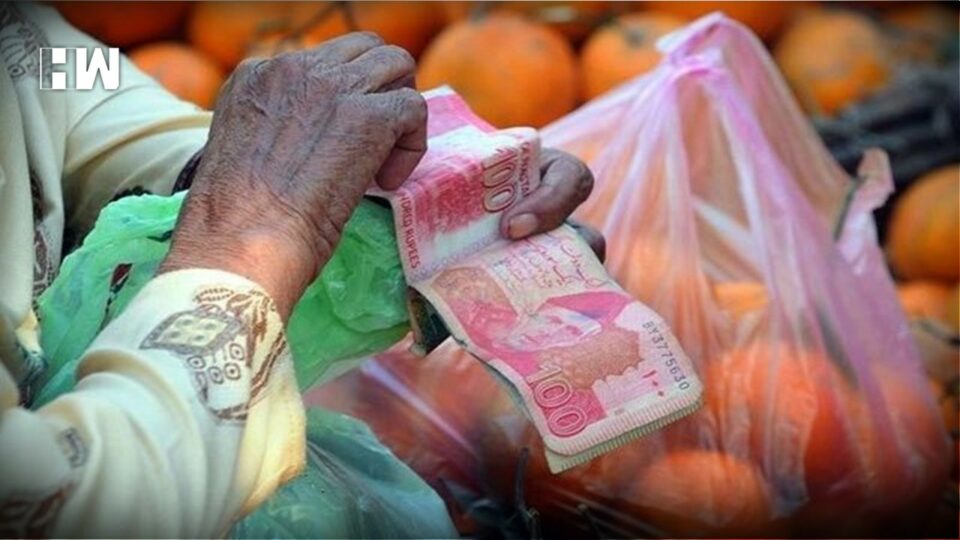Islamabad: Disruption in the supply of commodities due to the floods in Pakistan has increased the prices of petroleum products which has further resulted in a spike in the Sensitive Price Index to a record high at 44.58 percent indicating at skyrocketing inflation in the country.
According to the State Bank of Pakistan, the Sensitive Price Indicator (SPI) is designed to assess the price movement of essential consumer items at short intervals, on weekly basis, so as to take corrective measures. The Sensitive Price Index has broken all records and it currently stands at the highest level in history. According to Pakistan’s local media outlet, The Nation, during the last week, the weekly inflation rate in the country increased by 1.83 pc to reach a record high level of 44.58 pc.
Of the total 51 essential commodities, prices of 23 increased last week, while that of only seven decreased and 21 remained unchanged.
Moreover, as per a report issued by the Pakistan Bureau of Statistics on Friday, the prices of 23 essential commodities have increased in just one week ending on August 25, 2022.
Among the items that have become expensive, the price of tomatoes increased by 43.09 pc, onion by 41.13 pc, potatoes by 6.32 pc, eggs by 3.43 pc, garlic by 2.23 pc, dry milk by 1.53 pc, dal mash by 1.12 pc, cigarettes 2.26 pc and LPG 1.95 pc.
The items whose prices dropped include dal masoor which fell by 1.18 pc, vegetable ghee by 1 pc, cooking oil by 0.51 pc, sugar by 0.07 pc and mustard oil by 0.07 pc.
According to the PBS statistics, in terms of the decimal point of the sensitive prices on an annual basis during the last week, the inflation rate for the group with an income up to Rs 17,732 per month was 37.54 pc, the group having income from Rs 17,733 to 22,888 rupees per month – 43.51 pc, Rs 22,889 to Rs 29,517 per month – 41.97 pc, Rs 29,518 to Rs 44,175 per month – 41.90 pc and the group with a monthly income above Rs 44,176 – 45.28 pc, as per the media portal.
Meanwhile, Pakistan’s economy is slowing to around 3.5 per cent due to weakening economic conditions and the average inflation rate peaked at nearly 20 per cent by the end of the current fiscal year, according to the International Monetary Fund (IMF).
Citing sources, The Express Tribune reported that during talks for the completion of the 7th review of the bailout package, the global lender significantly revised its projections for the current fiscal year compared with the assessment that it had made at the time of the last review.
The IMF has shaved Pakistan’s previous year’s economic growth forecast by 1 per cent to 3.5 per cent. Meanwhile, the State Bank of Pakistan in this week’s monetary policy statement had said that the floods caused by unusually heavy and prolonged monsoon rains created downside risks for agricultural production, especially cotton and seasonal crops, and could weigh on growth this year.
Pakistan is grappling with a worse economic crisis and the deepening political turmoil is spawning doubts about the government’s ability to make tough decisions going forward and tackle the longstanding structural issues of the economy responsible for the recurring balance-of-payments crisis.
Amid this, the Pakistani citizens are taking their financial woes online and criticizing the country’s Prime Minister Shehbaz Sharif and Pakistan Muslim League Nawaz (PML-N) top leader Maryam Nawaz for doing nothing for the relief of the masses.
Recently, a video of a Pakistani woman surfaced, describing the skyrocketing prices of medicines, groceries and electricity in the country, especially in Karachi city and slamming Prime Minister Shehbaz Sharif and PML-N leader Maryam Nawaz.
The video was shared by Pakistani journalist Hamid Mir in which a woman identified as Rabia from Karachi could be seen slamming the government after skyrocketing inflation. The woman asks the government whether she should end her children’s lives by not feeding them anymore, The News International reported.
(Except for the headline, this story has not been edited by HW News staff and is published from a syndicated feed.)
As an independent media platform, we do not take advertisements from governments and corporate houses. It is you, our readers, who have supported us on our journey to do honest and unbiased journalism. Please contribute, so that we can continue to do the same in future.

